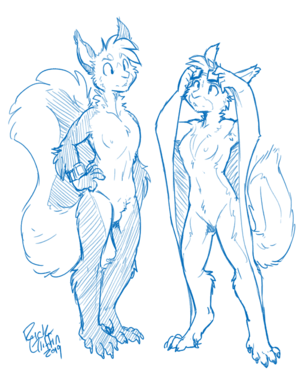Katakori: Difference between revisions
From Hayven Celestia
Content deleted Content added
J. N. Squire (talk | contribs) m →Demography: wikilink |
J. N. Squire (talk | contribs) →Anatomy: height stuff |
||
| Line 8: | Line 8: | ||
==Anatomy== |
==Anatomy== |
||
* Both alien species share the common trait of an special bone structure that make them lighter but less likely to break something after a fall or a bad landing (specific molecular structure, possibly some carbonXcalcium strong polymer?). |
* Both alien species share the common trait of an special bone structure that make them lighter but less likely to break something after a fall or a bad landing (specific molecular structure, possibly some carbonXcalcium strong polymer?). |
||
* Adults are usually at least 2 meters tall. Their body structure is made to be aerodynamic. No size difference between male and female. |
|||
* Taller and slender than [[geroo]], but smaller than [[anup]]. Around [[sourang]]-like height, but not ''that'' slender? |
|||
* Very varied fur colors (red, brown, fulvous, cream, tan, copper, black, sometimes green stripes to blend with vegetation, etc.). |
* Very varied fur colors (red, brown, fulvous, cream, tan, copper, black, sometimes green stripes to blend with vegetation, etc.). |
||
* Fluffy tails. |
* Fluffy tails. |
||
Revision as of 15:13, 23 July 2019

A katakori is a sapient "tree squirrel" species native to Txinxlurra.
Origins of the name
- Created by J. N. Squire.
- "katakori" is inspired from the Basque word katagorri. It litterally means "squirrel".
Anatomy
- Both alien species share the common trait of an special bone structure that make them lighter but less likely to break something after a fall or a bad landing (specific molecular structure, possibly some carbonXcalcium strong polymer?).
- Adults are usually at least 2 meters tall. Their body structure is made to be aerodynamic. No size difference between male and female.
- Very varied fur colors (red, brown, fulvous, cream, tan, copper, black, sometimes green stripes to blend with vegetation, etc.).
- Fluffy tails.
- Long ear tufts (like European squirrels).
Communication
Vocal
- Can speak multiple languages.
- Speak at least Siuri, a language also spoken by their twin sapient species, the polatosha.
Technological
- Use wristwatch communicators.
- Tooth-carved sticks.
Ecology
Habitat
Katatori are particularily adapted to forests. Their fur is adapated from temperate (poles) to warm (lower latitudes) temperatures from their homeworld.
Diet
Katatori are omnivorous. Their diet is mostly made of vegetables like fruits and nuts. For animal protein intakes, they can also eat eggs and small water animals.
Demography
Most of the katatori inhabits the Unity.They share their homeworld with the polatosha, the other sapient species originating from the planet.
